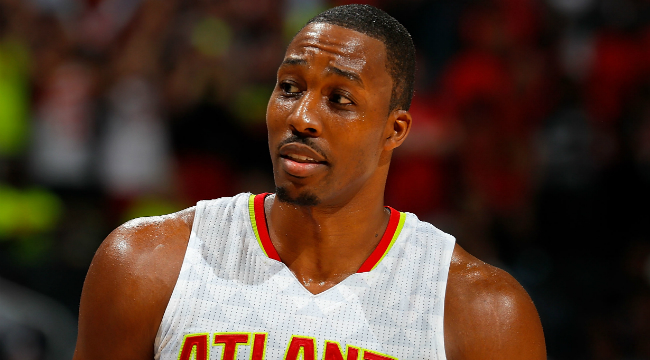
Dwight Howard was traded from the Hawks to the Hornets this summer for what amounted to a heap of scraps simply to get Howard out of the Atlanta locker room. No matter how you spin it, Miles Plumlee and Marco Bellinelli barely provide any cap relief for the Hawks and certainly don’t match up with Howard’s production.
Howard goes to a Charlotte team coached by Steve Clifford, who was an assistant in Orlando and Los Angeles during Howard’s tenure there. The Hornets (and Howard) are hoping Clifford can once again coax the most out of Dwight and bring him back to being a force in the NBA. There are questions as to whether Howard will ever adapt to the NBA or accept his new place in an ever-changing league as a big man, but the thought is that Clifford can make that happen.
A recent profile of Howard by Sports Illustrated‘s Lee Jenkins paints the former superstar as someone on the path to that understanding, both of his place in basketball and place in life. Jenkins notes that Howard has begun making steps to try and pull his life off the court back together, as Howard speaks of his past transgressions and trouble adjusting to the perks of fame as part of his past.
In his effort to move forward with his life and settle down, Howard told Jenkins he’s purchased a 700-acre farm in north Georgia where he plans to retire and become “Farmer Dwight.”
This summer Howard bought a 700-acre farm in north Georgia where he relaxes with the cows, hogs, turkeys and deer. He is particularly fond of the donkeys, which keep the coyotes away. To prepare for retirement, Howard has written what he calls his “99-year plan,” in which he hopes to become Farmer Dwight. “My dad grew up in the country, and whenever we drove to my grandma’s house, I was always fascinated by the farms we passed, how neat everything was,” Howard recalls. “I want to go out there, milk the cows, work the field. I’ll be able to tell you what watermelon came from what row.”
He has a garden on his estate in Suwanee where he grows squash, okra, tomatoes, figs, eggplant and cantaloupe. He proudly offers visitors samples of his fresh produce. In July, Howard visited the farm and mulled what crops he wants to plant. He likes what he hears about Moringa, coined the Miracle Tree because of its medicinal properties. “Everything is going to be organic, no pesticides,” Howard says. “We want to be in grocery stores, but I’d also like to organize a program where agriculture students at Georgia and Georgia Tech can come up and study the soil. This will be a place for my kids and their kids but also the community.”
It’s fairly amusing to imagine the near 7-footer as a farmer, but he wants to recapture something from his childhood as he fondly remembered trips to his grandparents’ house out in the country and he wouldn’t be the first former NBA player to take a post-basketball career turn as a farmer (Darko Milicic has done so back home in Serbia). As to whether any of this is proof of Dwight becoming more mature due to him having a plan for after basketball, that remains to be seen.
Jenkins points to some areas in which it seems like Howard has grown. From understanding and accepting the responsibilities of his having five children with five women, to trying to take on more veteran roles on teams with younger players and pointing to his early mistakes as things not to do. However, Jenkins also notes that Howard will still make himself out to be the victim in most of the storylines that have led to his downfall. From the request to get out of Orlando and rumors that he called for Stan Van Gundy to be fired to issues in L.A. and his recent speeding ticket in Atlanta, Howard points to it all being a big misunderstanding.
Charlotte will hope to get the old Dwight on the court and a new Dwight off of it. The problem being, we don’t know if either of those things exist.






